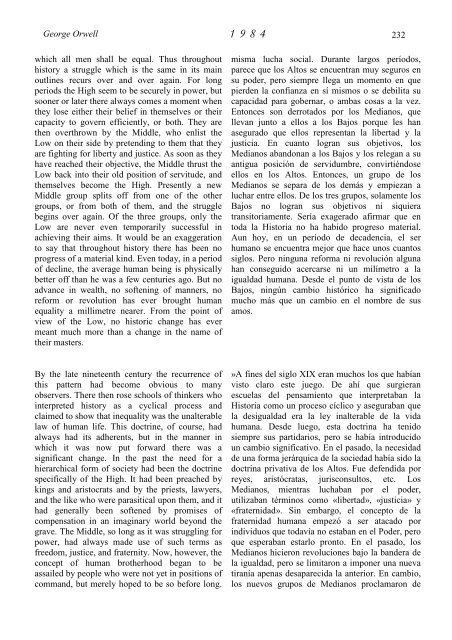You also want an ePaper? Increase the reach of your titles
YUMPU automatically turns print PDFs into web optimized ePapers that Google loves.
George Orwell 1 9 8 4<br />
which all men shall be equal. Thus throughout<br />
history a struggle which is the same in its main<br />
outlines recurs over and over again. For long<br />
periods the High seem to be securely in power, but<br />
sooner or later there always comes a moment when<br />
they lose either their belief in themselves or their<br />
capacity to govern efficiently, or both. They are<br />
then overthrown by the Middle, who enlist the<br />
Low on their side by pretending to them that they<br />
are fighting for liberty and justice. As soon as they<br />
have reached their objective, the Middle thrust the<br />
Low back into their old position of servitude, and<br />
themselves become the High. Presently a new<br />
Middle group splits off from one of the other<br />
groups, or from both of them, and the struggle<br />
begins over again. Of the three groups, only the<br />
Low are never even temporarily successful in<br />
achieving their aims. It would be an exaggeration<br />
to say that throughout history there has been no<br />
progress of a material kind. Even today, in a period<br />
of decline, the average human being is physically<br />
better off than he was a few centuries ago. But no<br />
advance in wealth, no softening of manners, no<br />
reform or revolution has ever brought human<br />
equality a millimetre nearer. From the point of<br />
view of the Low, no historic change has ever<br />
meant much more than a change in the name of<br />
their masters.<br />
By the late nineteenth century the recurrence of<br />
this pattern had become obvious to many<br />
observers. There then rose schools of thinkers who<br />
interpreted history as a cyclical process and<br />
claimed to show that inequality was the unalterable<br />
law of human life. This doctrine, of course, had<br />
always had its adherents, but in the manner in<br />
which it was now put forward there was a<br />
significant change. In the past the need for a<br />
hierarchical form of society had been the doctrine<br />
specifically of the High. It had been preached by<br />
kings and aristocrats and by the priests, lawyers,<br />
and the like who were parasitical upon them, and it<br />
had generally been softened by promises of<br />
compensation in an imaginary world beyond the<br />
grave. The Middle, so long as it was struggling for<br />
power, had always made use of such terms as<br />
freedom, justice, and fraternity. Now, however, the<br />
concept of human brotherhood began to be<br />
assailed by people who were not yet in positions of<br />
command, but merely hoped to be so before long.<br />
232<br />
misma lucha social. Durante largos períodos,<br />
parece que los Altos se encuentran muy seguros en<br />
su poder, pero siempre llega un momento en que<br />
pierden la confianza en sí mismos o se debilita su<br />
capacidad para gobernar, o ambas cosas a la vez.<br />
Entonces son derrotados por los Medianos, que<br />
llevan junto a ellos a los Bajos porque les han<br />
asegurado que ellos representan la libertad y la<br />
justicia. En cuanto logran sus objetivos, los<br />
Medianos abandonan a los Bajos y los relegan a su<br />
antigua posición de servidumbre, convirtiéndose<br />
ellos en los Altos. Entonces, un grupo de los<br />
Medianos se separa de los demás y empiezan a<br />
luchar entre ellos. De los tres grupos, solamente los<br />
Bajos no logran sus objetivos ni siquiera<br />
transitoriamente. Sería exagerado afirmar que en<br />
toda la Historia no ha habido progreso material.<br />
Aun hoy, en un período de decadencia, el ser<br />
humano se encuentra mejor que hace unos cuantos<br />
siglos. Pero ninguna reforma ni revolución alguna<br />
han conseguido acercarse ni un milímetro a la<br />
igualdad humana. Desde el punto de vista de los<br />
Bajos, ningún cambio histórico ha significado<br />
mucho más que un cambio en el nombre de sus<br />
amos.<br />
»A fines del siglo XIX eran muchos los que habían<br />
visto claro este juego. De ahí que surgieran<br />
escuelas del pensamiento que interpretaban la<br />
Historia como un proceso cíclico y aseguraban que<br />
la desigualdad era la ley inalterable de la vida<br />
humana. Desde luego, esta doctrina ha tenido<br />
siempre sus partidarios, pero se había introducido<br />
un cambio significativo. En el pasado, la necesidad<br />
de una forma jerárquica de la sociedad había sido la<br />
doctrina privativa de los Altos. Fue defendida por<br />
reyes, aristócratas, jurisconsultos, etc. Los<br />
Medianos, mientras luchaban por el poder,<br />
utilizaban términos como «libertad», «justicia» y<br />
«fraternidad». Sin embargo, el concepto de la<br />
fraternidad humana empezó a ser atacado por<br />
individuos que todavía no estaban en el Poder, pero<br />
que esperaban estarlo pronto. En el pasado, los<br />
Medianos hicieron revoluciones bajo la bandera de<br />
la igualdad, pero se limitaron a imponer una nueva<br />
tiranía apenas desaparecida la anterior. En cambio,<br />
los nuevos grupos de Medianos proclamaron de


